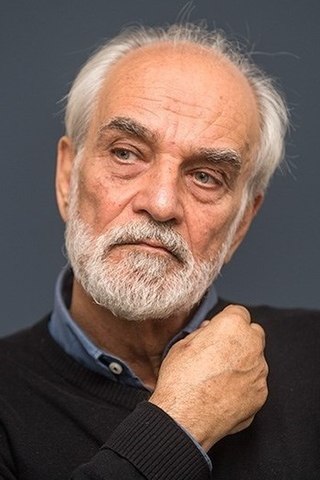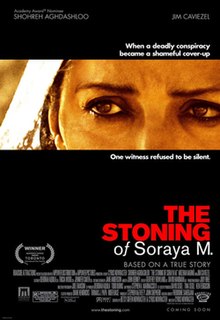Maryam is a 2002 film about a young woman who is an Iranian immigrant living in the United States at the time of the Iran hostage crisis. The film was written and directed by Ramin Serry. Mariam Parris plays the young woman. The film also features Shaun Toub as her father, Shohreh Aghdashloo as her mother, and David Ackert as her cousin, Ali, who becomes an Islamic fundamentalist.

House of Sand and Fog is a 2003 drama film directed by Vadim Perelman, with a screenplay written by Perelman and Shawn Lawrence Otto. It is based on the novel of the same name by Andre Dubus III.

Rajm in Islam refers to the Hudud punishment wherein an organized group throws stones at a convicted individual until that person dies. Under some versions of Islamic law (Sharia), it is the prescribed punishment in cases of adultery committed by a married person which requires either a confession from either the adulterer or adulteress, or producing four witnesses of sexual penetration.

Aydin Aghdashloo is an Iranian painter, graphic artist, art curator, writer, and film critic.
Soraya is a feminine Persian name. It is derived from the Arabic name for the Pleiades star cluster, Thurayyā. The name, also spelled Zoraya, is used in Spain and throughout the Spanish-speaking world with an origin in Al-Andalus. One historical example is Isabel de Solís, one of the final princesses of the Nasrid dynasty of Granada who converted to Islam and took the name Soraya or Zoraya. The name is also popular in Europe due to its association with Soraya Esfandiary-Bakhtiari, the second wife of Shah Mohammad Reza Pahlavi of Iran, who became a European socialite.

The Nativity Story is a 2006 American biblical drama film based on the nativity of Jesus and directed by Catherine Hardwicke. The film stars Keisha Castle-Hughes, Oscar Isaac, Hiam Abbass, Shaun Toub, Alexander Siddig, Ciarán Hinds, and Shohreh Aghdashloo.

Cyrus Nowrasteh is an American screenwriter, director, and producer of film and television. He has worked on numerous television series and made-for-TV movies including The Day Reagan Was Shot, Falcon Crest, Into the West, and the controversial docudrama The Path to 9/11. He has also directed the theatrical features The Stoning of Soraya M. (2009), The Young Messiah (2016), and Infidel (2020).
Atossa Leoni is an actress who has worked internationally in film, television, and theater since childhood.

Stoning, or lapidation, is a method of capital punishment where a group throws stones at a person until the subject dies from blunt trauma. It has been attested as a form of punishment for grave misdeeds since ancient times.
Freidoune Sahebjam (1933–2008) was a French-Iranian journalist, war correspondent, and novelist who resided in Neuilly-sur-Seine in France.

Aryana Farshad is a writer, director, and film producer born in Tehran, Iran.

Mozhan Marno is an American film and television actress. She is known for her roles in The Blacklist and House of Cards and played Soraya Manutchehri in The Stoning of Soraya M.. She was previously known as Mozhan Marnò, but returned to her given last name, Navabi, in 2023.
Kuhpayeh is a city in Tudeshk District of Kuhpayeh County, Isfahan province, Iran, serving as capital of both the county and the district. Kuhpayeh is an historic city 70 kilometres (43 mi) east of Isfahan and where the film The Stoning of Soraya M. is depicted.
The 14th Satellite Awards is an award ceremony honoring the year's outstanding performers, films, television shows, home videos and interactive media, presented by the International Press Academy at the InterContinental Hotel in Los Angeles.
Sakineh Mohammadi Ashtiani is an Iranian woman convicted of conspiracy to commit murder and adultery. She gained international notoriety for originally being sentenced to death by stoning for her crimes. Her sentence was commuted and she was released in 2014 after serving nine years on death row.

Navid Negahban is an Iranian-American actor. He has appeared on 24, Homeland, Mistresses, and as Amahl Farouk / Shadow King in the second and third seasons of FX's Legion. He has also starred as the Sultan in the live-action remake of Aladdin.

David Diaan, also known as David Davoodian, is a Los Angeles–based actor, writer, producer, and entrepreneur. He is best known for his satirical plays and his hilarious approach to issues surrounding the Iranian American community in the United States. He is an avid humanitarian and activist, especially in respect to the struggles of the freedom seeking citizens of his homeland, Iran.
The Noor Iranian Film Festival is an annual film festival held in Los Angeles, California, founded by cultural producer Siamak Ghahremani and co-founder Anthony Azizi in 2007. The festival's namesake comes from the word Nur, also spelled Noor, meaning to shed light or "noor," on Iranian culture and heritage through Iranian cinema. A non-profit, non-religious, and non-political organization, the Noor Iranian Film Festival (NIFF) was created to shed light, or ‘noor,’ on Persian culture, helping to express the beauty of a culture that is commonly misperceived due to its portrayal in the media. Additional to the main annual festival in Los Angeles, a tour of the program has made several return trips to cities such as Daytona Beach, San Diego, San Francisco, Seattle, and Washington D.C.
Rukhshana Media is an Afghan women's media organisation created in November 2020 in memory of Rukhshana, a young woman stoned to death in 2015 in Ghor Province for having fled with a lover after a forced marriage.

Zari Khoshkam, also known as Zahra Hatami in film circles, was an Iranian actress. She was the wife of filmmaker Ali Hatami and the mother of actress Leila Hatami.











